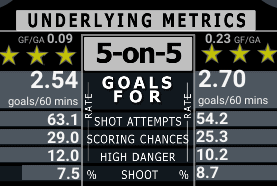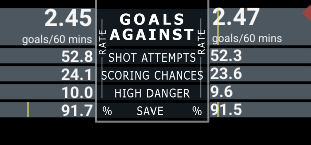With the proposed 24-team NHL play-in format, the Montreal Canadiens have a chance to make the 16-team playoffs. In the play-in round, the Habs will face the Pittsburg Penguins, who had 15 more points in the standings during the regular season.
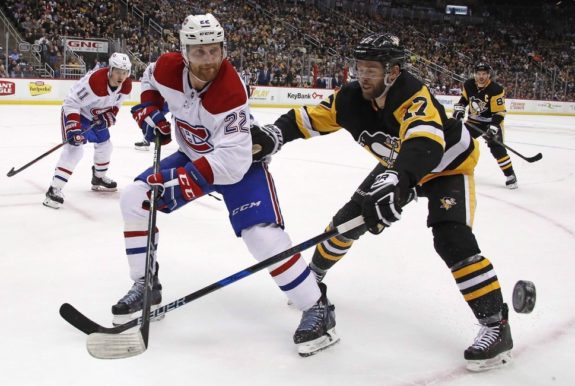
Both teams had issues with injuries through the season, and both will be relatively healthy for their series. Let’s take a look at how each team fared against the other and determine if the Habs have a legit chance to move past the Penguins and into the 2020 Playoffs.
Head-to-Head History
The Canadiens and the Penguins have only met twice in the playoffs, in 1998 and 2010. In 1998, Montreal bested the Pittsburgh 4-2 in the first round; Andy Moog played stellar in nets, and Mark Recchi and Vincent Damphousse led the way for the Habs with eight points each. Jaromir Jagr led the Pens with nine points, but the team could only muster more than two goals in a game once, a 6-3 victory in Game 4.
Related: Remembering the Canadiens’ 2010 Playoff Run
In 2010, the Habs had a magical run to the Eastern Conference Final. They faced Pittsburgh in the second round as underdogs and the teams exchanged wins through the first six games before Montreal finally won their second in a row to win the series 4-3. Mike Cammalleri and Brian Gionta led the way with eight points each, while Jaroslav Halak continued his stellar play in nets from the first round.
Based on their playoff history, the Canadiens have the head-to-head advantage 2-0. However, the play-in round will be a shorter, best-of-five series. Whichever team has the advantage in the following categories will likely win the series.
Offense
There is no real question as to who is better offensively. On paper, it’s the Penguins, but are they that much better? The teams are not as far off as one would think playing 5v5. The Canadiens scored 2.54 goals/60 (minutes) while the Penguins were at 2.70. The Habs had 29.0/60 scoring chances (SC) and shot attempts (SA) 63.1/60, while Pittsburgh had 25.3/60 and 54.2/60 respectively. However, the Penguins scored on more of their chances than the Habs did, 8.7% to 7.5%.
From the graph above, you can see that the Habs were not far behind the Penguins. Granted, the Penguins dealt with injuries to Sidney Crosby, Jake Guentzel, and many others, all of whom impact their offense immensely. For the Habs to keep pace, they will need to rely on the Philip Danault line to shut down Crosby and, if need be, Evgeni Malkin.
Pittsburgh has the advantage here: 1-0 Penguins
Defense
Montreal’s defense was the most questionable part of their game, but it was also the most improved throughout the season. The Penguins allowed 24 fewer goals against than the Canadiens, in two fewer games but, statistically, they were not far apart.
The Canadiens averaged 2.45 GA/60 to Pittsburgh’s 2.47 GA/60. Shot attempts were 52.8 to 52.3/60, high danger shots 24.1 to 23.6/60, and save percentage (SV%) was 91.5 to 91.7/60. The teams were pretty much even at 5v5.
From the above graph, it’s hard to determine who has the edge on defense. Montreal allowed the higher scoring chances and high-danger shots but had a slightly better SV%. In the end, it will come down to defensive depth, which neither team has in abundance.
The slight edge goes to the Canadiens: Tied 1-1
Special Teams
This was probably the most topsy turvy part of the Habs’ season. In the first half, the power play (PP) was great, while the penalty kill (PK) was awful. In the second half, it was vice versa, and the PK rose from 28th to 19th by season’s end as the PP dropped from 12th to 22nd. The Canadiens couldn’t get both to click at the same time, while the Penguins’ PP was 16th in the league, not as high as you would think for a team with Crosby and Malkin, and their PK was a respectable 10th in the league.
Related: Penguins vs. Canadiens – Potential First-Round Matchup Preview
This is pretty much a no-brainer; the Penguins, even with an average PP, are well above the Canadiens on special teams. The GF/60 isn’t close, with the Pens, leading 7.26 to 5.99, almost two goals ahead. The PK isn’t much closer, with Pittsburgh leading 6.50 to 7.59 GA/60.
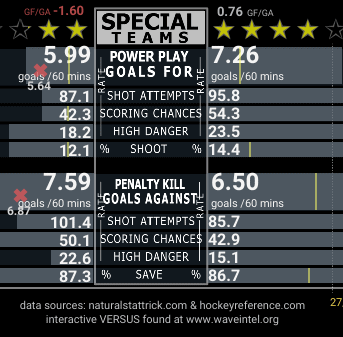
This is a clear win for the Penguins unless the Canadiens can get it together in the play-in round: 2-1 Penguins
Goaltending
This should be an easy win for the Habs, but that will depend on who the Penguins decide to start in net. In the regular season, Tristan Jarry had better stats than Matt Murray, with a goals-against average (GAA) of 2.43 compared to 2.87 and a SV% of .921 to .899. Murray, however, has the experience in playoff games and led the Penguins to their last Cup in 2017. Carey Price, on the other hand, comes into the play-in with a GAA of 2.79 and SV% of .909 for the season. Although his regular-season numbers are average, he has played well in the past three playoffs and has a career .914 SV% in the postseason.
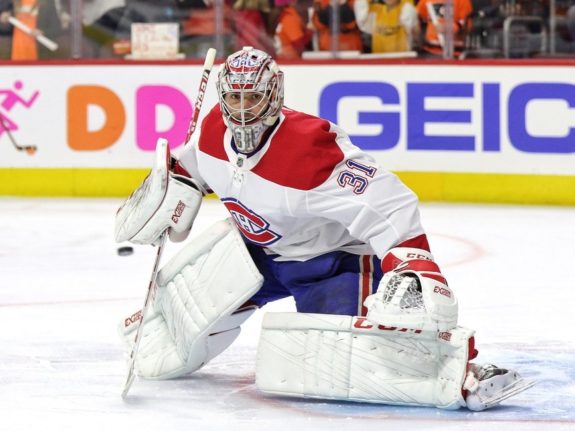
Price is capable of winning the series by himself, which is why the players voted against an even shorter three-game series. Whether or not Pittsburgh goes with Jarry or Murray, the Habs have the edge with Price, especially in a best-of-five. Tied 2-2
Overall
This matchup is pretty close, even though the two teams weren’t close in the standings. The Penguins had their share of injury trouble along with the Habs, but they had one thing the Canadiens didn’t: depth. Despite the injuries, the Penguins were deep enough to still win, while the Canadiens fell hard after losing some key players. When or if the play-in round starts, which looks more and more likely, injuries shouldn’t be much of a factor. The Canadiens will almost everyone back except maybe Victor Mete and definitely not Jesperi Kotkaniemi. The Penguins should have a very key player in back in Jake Guentzel.
Related: Penguins’ 13 Seasons of Playoff Memories: Stanley Cup Final
Price will be a huge factor, and so will Crobsy. The deciding factor in this series, however, will be the Penguins’ depth which the Canadiens don’t have the skills to match. Pittsburgh’s lineup is too deep and Danault can’t play every shift. If the Canadiens had kept key defensive players like Nick Cousins and Nate Thompson at the trade deadline, maybe the edge would be different. However, you can’t blame general manager Marc Bergevin for making those moves because, at the time, they were out of the playoffs with little hope of getting in.
This will be a hard-fought series but, in the end, the edge goes to Pittsburgh: Penguins win the series 3-2
